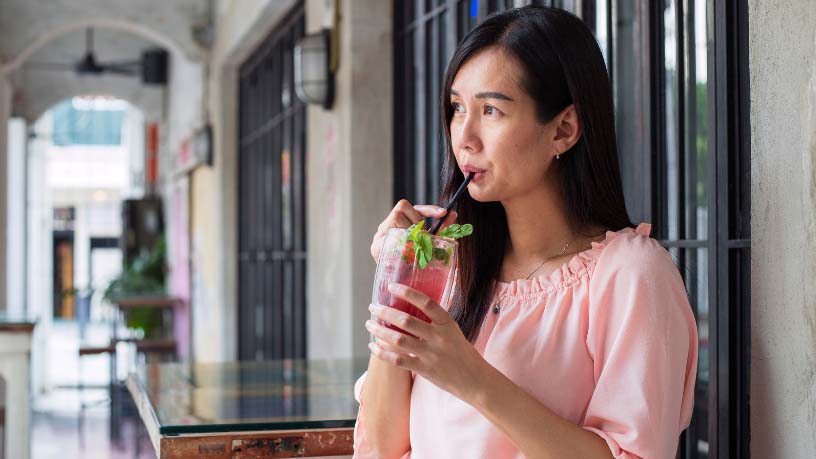On this page
Key takeaways
- According to the World Health Organisation, there’s no level of drinking that’s completely risk-free for our health.
- Alcohol use disorder is when drinking turns into a pattern that starts to cause problems in your life.
- There are medications available that can help ease cravings and make cutting back feel more manageable.
When is alcohol use a problem?
Drinking can be synonymous with socialising in Australia, but when it comes to alcohol, there’s no truly safe level.
“Alcohol is classed by the World Health Organisation as a class 1 carcinogen,” says Medical Director at Clean Slate Clinic, Dr Chris Davis. “The less you drink, the safer it is.”
The National Health and Medical Research Council suggests that healthy men and women should drink no more than 10 standard drinks a week and no more than 4 standard drinks on any one day.1
“However, it’s not as simple as saying ‘if I drink less than 10 standard drinks a week, I don’t have a problem,” says Chris. “If alcohol is having a negative effect on your life, or you feel like it’s a problem for you, that probably means it is.”
How do you know whether your drinking is risky?
“There's no medical definition for what an alcoholic is,” says Chris. “It’s not a term we tend to use because it comes with so much stigma.”
Alcohol Use Disorder (AUD) is a problematic pattern of alcohol use.
“Many regular drinkers fit the criteria for a mild alcohol use disorder,” says Chris. “Perhaps you look forward to Friday so you can have a drink, have tried Dry July but not been able to make it to the end of the month, or you miss out on weekend activities because you’re hungover. These are all signs that alcohol might be causing you problems.”
If you relate to 2 or more of the following criteria2, then it’s worth seeking help with your alcohol intake:
- Alcohol is often taken in larger amounts or over a longer period than was intended.
- There's a persistent desire or unsuccessful efforts to cut down or control alcohol use.
- A great deal of time is spent in activities necessary to obtain alcohol, use alcohol, or recover from its effects.
- Craving, or a strong desire or urge to use alcohol.
- Recurrent alcohol use resulting in a failure to fulfil major role obligations at work, school, or home.
- Continued alcohol use despite having persistent or recurrent social or interpersonal problems caused or exacerbated by the effects of alcohol.
- Important social, occupational, or recreational activities are given up or reduced because of alcohol use.
- Recurrent alcohol use in situations in which it's physically hazardous.
- Alcohol use is continued despite knowledge of having a persistent or recurrent physical or psychological problem that is likely to have been caused or exacerbated by alcohol.
- Tolerance, as defined by either of the following:
*A need for markedly increased amounts of alcohol to achieve intoxication or the desired effect.
*A markedly diminished effect with continued use of the same amount of alcohol. - Withdrawal, as manifested by either of the following:
*The characteristic withdrawal syndrome for alcohol
*Alcohol (or a closely related substance, such as a benzodiazepine) is taken to relieve or avoid withdrawal symptoms.
How do you take the first step in drinking less?
“Many people will hide or minimise their alcohol use because of the guilt and shame they feel around it,” says Chris. “Having an honest conversation with someone about your drinking, and the effects it’s having on your life can motivate many people to get help. Your GP is always a good place to start. They will be able to give you resources and refer you to the right support networks.”
If you’re worried about a loved one, the key is “respectful curiosity,” says Chris.
“Ask how they’re doing, how their mood is, or how they’re sleeping,” he suggests. “Then you can suggest that any negative feelings might be linked to their alcohol intake. Being there in a supportive way and having an open discussion can be really helpful.”
The Alcohol and Drug Information Service is available 24/7. It's staffed by counsellors and nurses who will you give you helpful advice about any alcohol issues. You can call them on 1800 250 105.
“There is a huge amount of support there if you know how to access it,” says Chris.
Safe, supported alcohol detox at home
Can you ‘cure’ alcohol use disorder?
“If someone has developed a problem with drinking, there’s no guarantee that if they stop drinking they will never run into problems with alcohol again,” says Chris.
“The key is having the right support and treatment. One of the AA mantras is that ‘you alone can do this,’ but when it comes to drinking less, I believe that you can’t do it alone.”
“Recovery is absolutely possible for everyone, even if you’ve been through detox and rehab a number of times. Every time someone lapses, you learn more about yourself and your relationship with alcohol, which gets you closer to where you want to be.”
Can medication help me stop drinking?
“There are safe, effective anti-craving medications which reduce the urge to drink,” says Chris.
These are usually used as part of holistic treatment, alongside therapy or counselling. “People often drink for a reason, and those issues often can’t be dealt with when alcohol is blurring the picture,” he explains. “An important first step is to remove alcohol or minimise its effects so then any underlying mental health conditions or life circumstances can be identified and treated.”
Support
If you’re in need of urgent support, there is help available:
Lifeline provides 24/7 suicide prevention and crisis support. Call 13 11 14
Suicide Call Back Service offers free 24/7 counselling support if you are at risk of or affected by suicide. Call 1300 659 467
Beyond Blue offers mental health support. Call 1300 22 4636
Resources
Clean Slate Clinic offers a range of treatments for dependence on alcohol, stimulants, cannabis and other drugs.
Alcoholics Anonymous offers free recovery programs around Australia.

At Bupa, trust is everything
Our health and wellbeing information is regularly reviewed and maintained by a team of healthcare experts, to ensure its relevancy and accuracy. Everyone's health journey is unique and health outcomes vary from person to person.
This content is not a replacement for personalised and specific medical, healthcare, or other professional advice. If you have concerns about your health, see your doctor or other health professional.
1National Health and Medical Research Council (2025) Alcohol Guidelines National Health and Medical Research Council
2National Institute on Alcohol Abuse and Alcoholism (2025) Alcohol Use Disorder: From Risk to Diagnosis to Recovery National Institute on Alcohol Abuse and Alcoholism
You might also kike
How alcohol affects your body
That extra glass of wine you had last night may have more of an impact on your health than you realise.
Grey area drinking: When that extra glass is more than a treat
A nightly glass or 2 of your favourite drop to unwind can become harmful if you don’t know the signs of dependence.
The benefits of going alcohol free for a month
We all know drinking alcohol can have some pretty serious consequences for our health, but what happens when we stop drinking? Even just for a month?
5 mocktails for mindful drinkers
Going alcohol-free doesn’t mean you have to miss out on all the fun! Check out 5 of our favourite deliciously fruity and colourful mocktails.





